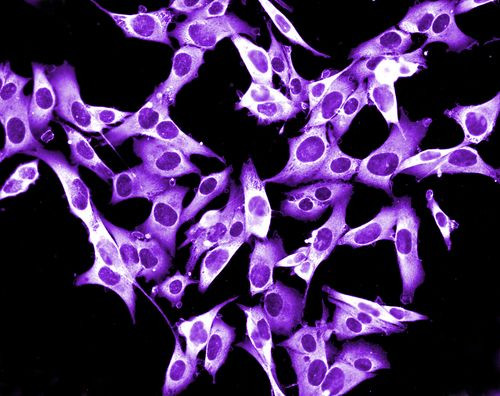Blocking 'Survival Signal' From Immune Cells Could Be Key To Fighting Drug Resistance In Melanoma Patients

Melanoma is the most aggressive form of skin cancer, and often at advanced stages it gets resistant to conventional drug therapies. Now new research has found out the cause for this resistance: macrophages, a type of immune cell that releases "survival signals" that make melanoma cells resistant to drugs.
This discovery was made by cancer research scientists at the University of Manchester. Their findings appear Thursday in Cancer Discovery. When the scientists blocked the ability of the macrophages to release the survival signal, called TNF (tumor necrosis factor) alpha, the melanoma tumors were much smaller and easier to treat.
Melanoma is a result of genetic mutations on the skin, caused by ultraviolet radiation from sunshine or tanning beds. These mutations cause the skin cells that carry the pigment melanin to multiply and produce tumors on the skin. While exposure to UV is considered to be the foremost cause of melanoma, genetic causes have also been implicated.
When advanced melanoma patients receive chemotherapy or radiotherapy as part of their treatment, it causes inflammation, increasing the number of macrophages in the body. This leads to increased TNF alpha production. The primary role of TNF is the regulation of the macrophages. It promotes acute inflammatory response, and this has been implicated in the cause of several clinical problems associated with autoimmune disorders, such as rheumatoid arthritis, inflammatory bowel disease, and asthma.
In the case of melanoma, TNF alpha has been found to promote malignant cell growth, invasion, and metastatic potential. The current research showed that blocking this chemical survival signal could help to develop new ways to treat melanoma.
"This discovery shows that immune cells can actually help melanoma cells to survive. Particularly when patients are receiving treatment, the immune cells produce more of the survival signal, which makes treatment less effective. So combining standard treatment with immunotherapy at the same time could potentially provide more long-lasting and effective treatments to increase survival,” said study author Dr. Claudia Wellbrock in a press release.
According to the American Cancer Society, an estimated 76,100 new melanoma diagnoses and 9,710 melanoma deaths are expected this year.
"Melanoma is particularly difficult to treat as many patients develop resistance to standard treatment within a few years. This research provides a key insight into why this is the case,” said study coauthor Richard Marais. "Drugs which block this 'survival signal' have already been developed and using these along with standard treatment may be a promising new approach for melanoma patients.”
Source: Wellbrock C, Marais R, Smith, et al. The immune-microenvironment confers resistance to MAP kinase pathway inhibitors through macrophage-derived TNFα, Cancer Discovery. 2014.



























